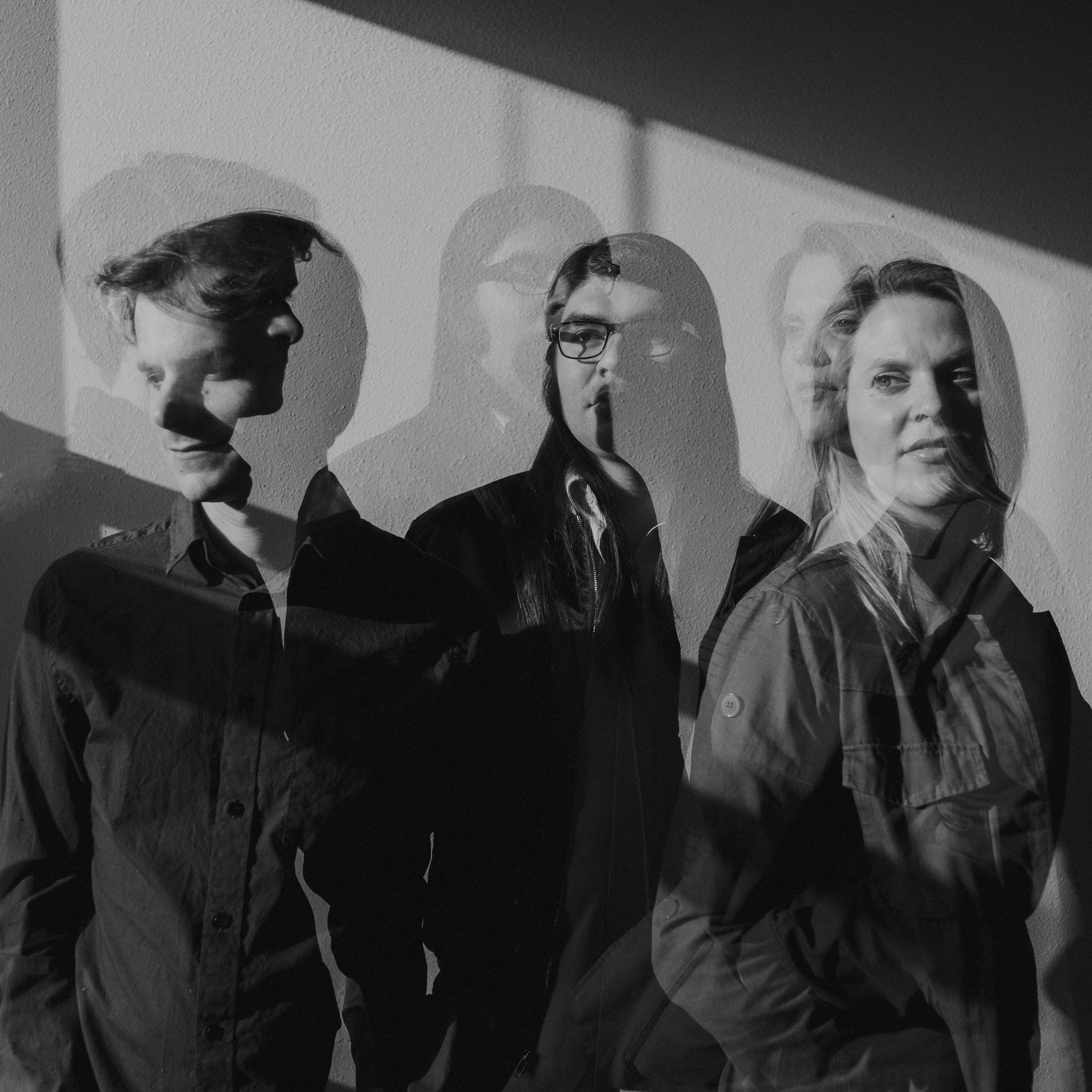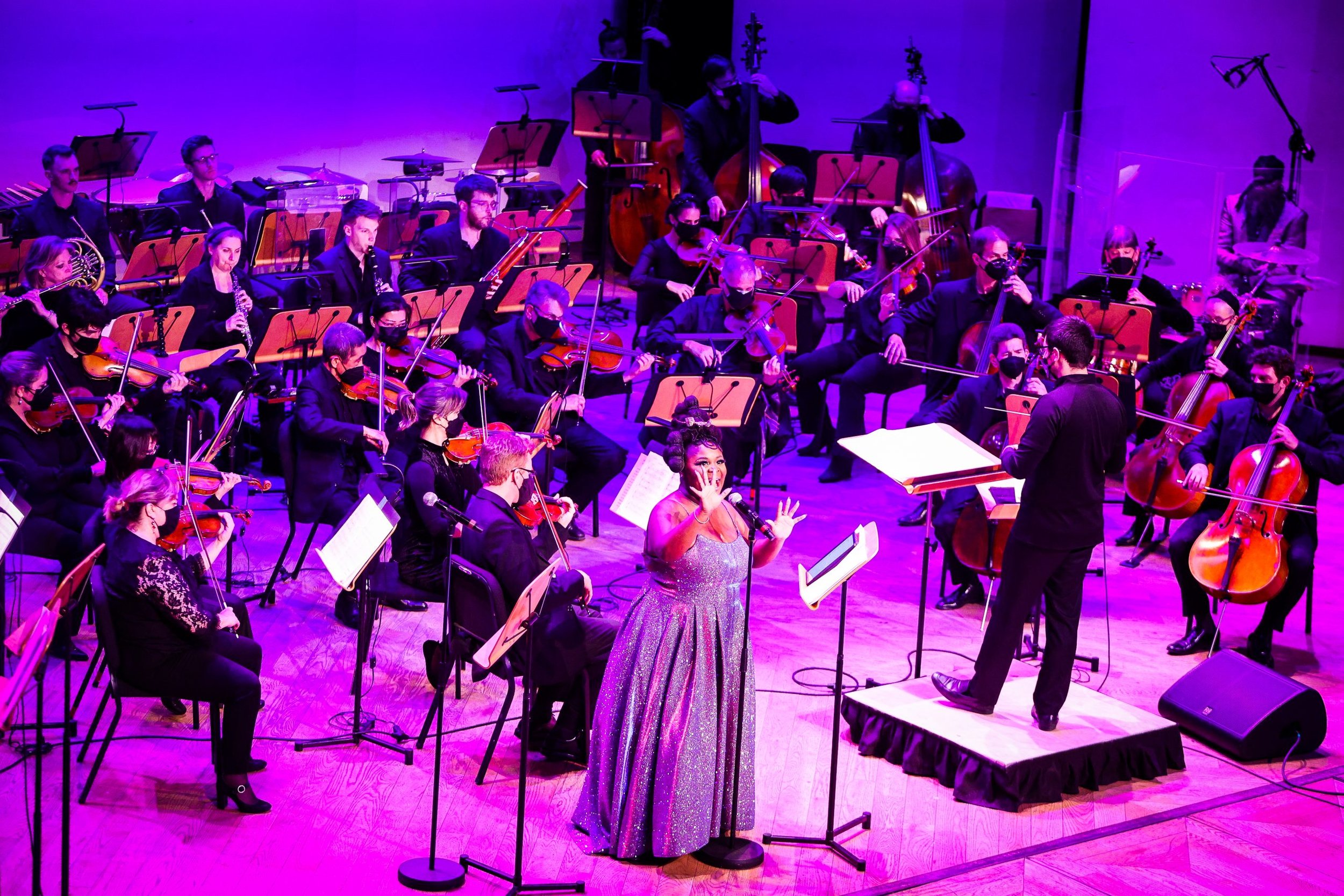Jonny Campos Expresses Himself with Carbon Poppies

Peter DeHart, Jonny Campos, and Allison Bohl DeHart, by LeeAnn B. Stephan
The Lost Bayou Ramblers’ guitarist feeds his love of indie rock with his little-known side project.
Ten years ago, Lost Bayou Ramblers guitarist Jonny Campos released And Don’t the Kids Just Love It, a five-song EP with his indie rock trio, The Carbon Poppies. If you blinked and missed it, you’re not alone, but that didn’t stop Campos from celebrating the 10-year anniversary of that release with Strangers, a new three-song EP.
Campos laughs when talking about this anniversary, counting off the obstacles between the band and notoriety.
“Barely plays live, only has EPs, no full lengths,” he says, cracking up. “It’s just a three-piece who thought, Ehhh, let’s record now.” But the songs scratch a musical itch that the Ramblers’ version of Cajun music doesn’t for Campos, as the time and money spent mixing it in a Los Angeles studio makes clear.
Campos entered the public eye in the Lafayette-based indie rock band Brass Bed, and indie rock is a musical passion he hasn’t shaken. He’s joined in The Carbon Poppies by Brass Bed member Peter DeHart and his wife, Allison Bohl DeHart, and the new songs come from that world. You can hear a Beatles influence in “Never Go Outside,” “Strangers,” and “In ,” but you can hear Beatles in almost anybody who makes melodic pop/rock music after 1964. Campos points more specifically to the early 1980s and the first generation of indie rock on Rough Trade and particularly New Zealand’s Flying Nun Records. The Clean made an impression, as did Television Personalities, whose debut album title Campos appropriated for The Carbon Poppies’ first EP. The Replacements borrowed The Beatles’ Let it Be, so he felt like had all the permission he needed.
Campos realized while mixing the new songs that the harmonies unintentionally echoed The New Pornographers, “someone I’m not a huge fan of,” he says. But talk about harmonies and parts seems beside the point since Campos’ lo-fi production allows parts to smear together until the band sounds like one instrument at times. That in part reflects the way the songs were recorded in home studios, but it’s also an aesthetic choice. “It serves the material,” he says. “It’s more approachable that way.”
Approachable is a good word for the songs, and the lo-fi works as planned. They don’t sound like grand statements or invite analysis, much less musical scrutiny. They’re slyly easy to hear and enjoy simply as cool tunes. They’re subtly textured and reward repeated listens, but they don’t present themselves as songs that require, much less demand a deeper dive. They’ re songs that Campos can take pride in while also finding any effort to promote them a bit silly. They are what they are, but in the big picture, they’re more than just that for Campos.
Campos started playing guitar in the Ramblers in 2014, and with no background in it, he was lost at first. When he started, he had sheets of paper that mapped out the songs at his feet onstage, but he quickly learned that those guides weren’t enough. When singer Louis Michot went to a certain note in a song, the chord changed no matter what the papers said. He also discovered the hard way that he had to keep an eye on Andre Michot’s accordion because the chart might announce one key but they would play the song in one that worked with the accordion.
Fortunately, the band’s reputation as The Velvet Underground of Cajun music gave him some outs. “Anytime I didn’t know where I was, hit delay or some kind of effect,” Campos says, laughing. “I can add apply feedback, drones, and lean into all the things people already think they hear to get more Velvet.” Those gestures mimicked musical roles played by other instruments so they made not only sense but made the Ramblers sound contemporary. Over time, they evolved from spontaneous solutions to Campos’ musical signature in the band and on 2017’s Kalenda, he often sounds like the Lost Bayou Thurston Moore.
Those experiences make good stories, but they also make for good gigs to play because they’re the dream of most musicians. They’re not simply playing songs they’ve played the same way hundreds of times; they’re making active musical choices onstage. They have to be 100 percent committed to the moment and really hear everybody onstage to stay active in the musical dialogue that is taking place.
“With Lost Bayou, you can’t get distracted,” Campos says. “With indie rock, you rehearse a million times to make it, like, This is what it’s supposed to sound like on the record. This is what it’s supposed to sound like live. It’s different sides of the same coin.”
Campos is aware that he has it good. He has friends from indie rock bands who now play in cover bands, which he understands. Rock ’n’ roll dreams may run into the wall of financial and family obligations, but the fun of playing in a band stays real. Gigs mean they get to hang out with their friends and drink some beer. They get to make a rock ’n’ roll noise, “and there’s some money at the end because people are actually going to go to the show!” he says, laughing. “There’s no hate for that.”
Performing with The Lost Bayou Ramblers and Jonny Campos and Today’s Hunks gives him some of that, and he gets a sense of professional pride by taking session gigs as a bass or steel guitar player. The part he has missed is the personal expression because while he’s playing a lot of music, he’s rarely playing his music. In 2020, he released Droste, an ambient EP under the name Weeks Island, but while it is unquestionably a musical experience, it’s also a conceptual one that tries—successfully—to explore a sonic moment and see how long he could make it last. The Carbon Poppies is Campos on his home turf, writing his version of the music that made him want to play in the first place. It’s the music that he hears as an extension of himself.
Session work taught him not to be precious about parts, but he feels comfortably, even casually bold when making indie rock. While working on “In Two,” Campos decided he heard keyboards on it. The only problem? He didn’t play keyboards. The solution?
“I asked the engineer, What keys can I not hit?” and quickly, intuitively decided what to play with those few instructions in mind.
Campos has had the experience of treating a band like a career goal with Brass Bed. They went through the anxiety of financing and touring albums and living and dying by gigs. They even got glowing press notes when NPR’s Robin Hilton wrote, “The oddly buoyant and utterly captivating album [The Secret Will Keep You] evokes a sad parade of broken hearts, loneliness, death, fear and even madness. Lovers come and go, spirits are crushed, lies are told. But for the most part, Brass Bed maintains at least a veneer of good cheer, complete with sweet harmonies and sprightly beats.”
Campos is not looking for The Carbon Poppies to be that thing again. He’s not planning Carbon Poppies tours, and while the Spanish label Elefant approached him to put out And Don’t the Kids Just Love It, he’s fine with the possibility that the new songs will only live in digital form on Bandcamp. “This is for us,” he says. “This is something I can do. Anybody want to do it with me?”
Creator of My Spilt Milk and its spin-off Christmas music website and podcast, TwelveSongsOfChristmas.com.






